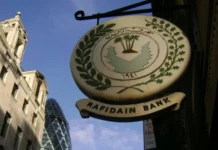Iraq Is At The Heart Of A Global Digital Storm. Iraqis Are Increasingly Buying Cryptocurrencies, And There Are Warnings Of Risks To The Iraqi Economy.
September 8, 2025 Baghdad / Iraq Observer In recent years, Iraq has witnessed an escalating debate about cryptocurrencies, a phenomenon that has swept the world, transforming money flows from traditional banking channels to a borderless and unregulated digital space.
While Iraq ranks relatively high globally in cryptocurrency adoption indicators, official voices are increasingly raising their voices, most notably the warnings of the Central Bank of Iraq and the Prime Minister’s financial advisors, regarding the legal, financial, and security risks these currencies pose, which could be devastating to individuals and the national economy.
Reasons Why Iraqis Are Turning To Cryptocurrencies
Mazhar Mohammed Saleh, the financial advisor to the Prime Minister, explained in a statement to the Iraq Observer that the use of cryptocurrencies in Iraq is due to “many reasons,” most notably individuals’ reliance on these currencies for remittances abroad to avoid the fees and restrictions of the traditional banking system.
He added that the lack of banking options, especially in underserved areas, has prompted many to opt for decentralized digital methods that the digital space easily provides.
Saleh believes that this phenomenon is not limited to Iraq, but that it has taken on a more dangerous character in the country due to the fragility of the traditional financial system and the lack of official channels for citizens to resort to.
This has made cryptocurrencies a quick and accessible option for a wide segment of the population, especially young people.
*Central Bank warnings and looming risks Despite the growing popularity, Saleh notes that the Central Bank of Iraq has issued stern warnings against dealing or trading in cryptocurrencies, citing the risks associated with financial volatility, fraud, and terrorist financing.
He explained that “the risks of using cryptocurrencies are very significant and real,” as many young people have been exposed to fraud, significant financial losses, and a lack of legal recourse due to dealing with unlicensed platforms.
He explained that trading often takes place through unofficial brokers or using virtual private networks (VPNs) to circumvent restrictions, making these transactions far removed from any legal or banking protection.
The financial advisor emphasized that relying on informal methods, such as brokers in neighboring countries, to facilitate transfers or withdrawals increases the fragility of these transactions.
Digital Theft And Lack Of Guarantees
Furthermore, the high volatility makes people vulnerable to quickly losing their savings with any sharp change in cryptocurrency prices. Saleh continues that one of the most significant risks of this phenomenon is the exposure of traders to what he calls “digital theft,” given that trading is illegal and lacks any safeguards or frameworks to protect investors.
He notes that the absence of a protective banking or legal authority makes trading in cryptocurrencies an uncalculated risk that could wipe out individuals’ savings in an instant.
He also pointed out that these operations constitute a form of “digital money laundering,” which falls under the Anti-Money Laundering and Counter-Terrorism Financing Law.
He noted that AML/CFT regulations apply to digital transactions, especially if they are linked to a criminal purpose, indicating that violators face severe penalties that may include imprisonment for 5 to 15 years, or a fine of up to five times the amount of laundered funds.
*Iraq in the “Global Adoption” Index of Cryptocurrencies
In contrast to these warnings, international data confirms the extent of the phenomenon’s spread in Iraq. The “Global Adoption” Index for Cryptocurrencies revealed that Iraq ranked relatively high globally, ranking among the top third of countries worldwide in digital currency use.
According to the sixth edition of the global index, which ranks 151 countries, Iraq ranked 44th globally, with a score of 0.05, placing it at the forefront of the region’s countries that have adopted cryptocurrencies at the grassroots level.
Iraq outperformed countries such as Saudi Arabia, Oman, Kuwait, the UAE, Qatar, and Bahrain in this ranking. However, countries such as Türkiye, Yemen, and Jordan ranked higher than Iraq, indicating that the Middle East region as a whole is witnessing a frantic race in the field of digital currencies.
Asia-Pacific: The Largest Growth Arena
Internationally, data showed that the Asia-Pacific region was the fastest-growing region in cryptocurrency activity, with a 69% increase in value received year-on-year over the past twelve months.
Total cryptocurrency transaction volume in the region also increased from $1.4 trillion to $2.36 trillion, reflecting the global boom in this sector. https://observeriraq.net/العراق-في-قلب-العاصفة-الرقمية-صعود-في/
Strengthening Digital Infrastructure
Economic 09/09/2025 Dr. Nabil Rahim Al-Abbadi Electronic signatures are a cornerstone of banks’ digital transformation, providing a reliable technical and legal basis for electronic transactions.
This aligns with Iraq’s efforts to improve its digital infrastructure, as stated by the Minister of Communications.
Relying on electronic signatures will reduce the need for paper documents, lowering operational costs associated with printing, storage, and transportation.
It will also speed up transaction procedures such as opening accounts and issuing loans, reducing waiting times from days to minutes in some cases. Furthermore, it uses advanced encryption technologies, reducing the chances of forgery and fraud.
This enhances customer confidence in digital banking services, a vital step in an environment marked by increasing cyber risks.
Having an internationally recognized electronic signature means that Iraqi banking documents and transactions will be accepted internationally, opening doors for cooperation with international banks and making Iraq more attractive to foreign investment.
Digital signatures are the fuel for accelerating digital banks (or digital branches of traditional banks), enabling the provision of complete services online without the need for a physical presence, such as opening accounts completely remotely, signing contracts and agreements securely, and completing lending and financing transactions seamlessly.
With a solid legal and technical foundation, banks can develop and offer innovative financial services such as mobile banking with a more secure experience, crowdfunding platforms that require authenticated signatures on agreements, and Wealth-Tech (digital wealth management) services that rely on secure electronic contracts.
Electronic signatures eliminate geographical barriers, allowing banks to reach customers in remote areas or those who prefer a fully digital banking experience.
This aligns with the digital transformation vision that aims to include all citizens.
Despite the significant advantages, the success of e-signatures in the Iraqi banking sector faces some challenges, most notably digital infrastructure. Gaps in internet coverage and reliability remain in some areas of Iraq, potentially limiting the effectiveness of e-signatures.
Culture and trust are also key here, and both customers and employees need to be educated about the importance and security of e-signatures.
Intensive training programs are also needed, as is cybersecurity.
With increased reliance on digitization, banks increasingly need to invest heavily in advanced cybersecurity systems to protect customer data and transactions from attacks.
The launch of e-signatures in Iraq is a step in the right direction and could be a powerful catalyst for the banking sector.
To realize the full benefits, collaboration between the public and private sectors is essential:
Banks should work closely with the Ministry of Communications and regulatory authorities to ensure that e-signature systems comply with international standards, invest in infrastructure and security, and adopt technologies such as cloud computing and blockchain to enhance security and efficiency.
I see the imperative of organizing comprehensive awareness campaigns to educate customers on the benefits and use of electronic signatures to build trust and drive adoption.
I also believe it is imperative to conduct ongoing training for staff to develop the skills of bank employees to navigate new technologies and manage digital platforms efficiently.
In short, this decision is not just a technical addition, but a strategic shift that lays the foundation for the Iraqi banking sector to compete regionally and globally, and to enter the era of digital banking with confidence and security. ttps://alsabaah.iq/120203-.html
For current and reliable Iraqi news please visit: https://www.bondladyscorner.com






